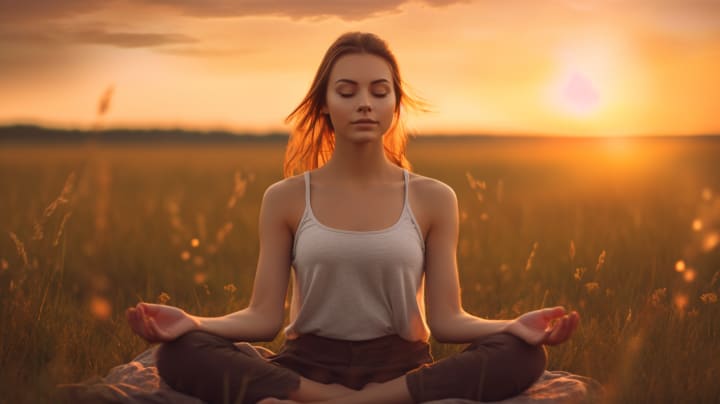
Introduction: The Path to Serenity
In the midst of our fast-paced and chaotic lives, finding moments of tranquility and inner peace can seem like an elusive dream. However, there is a powerful practice that has stood the test of time and holds the key to unlocking the serenity within us—meditation. Meditation is a transformative technique that allows us to calm our minds, cultivate mindfulness, and tap into a profound sense of inner peace. In this article, we will delve into the world of meditation, exploring its benefits, techniques, and answering frequently asked questions to guide you on your journey towards a more centered and mindful existence.
1. What is Meditation? Unveiling the Essence
At its core, meditation is a practice that involves training the mind to focus and redirect thoughts. It is a mental exercise that allows us to achieve a heightened state of awareness and inner stillness. By engaging in meditation, we create an opportunity to detach from the constant stream of thoughts and distractions that occupy our minds. Through various techniques, we learn to observe our thoughts without judgment and gently bring our attention back to the present moment.
2. Benefits of Meditation: Nurturing the Mind, Body, and Soul

Meditation offers a multitude of benefits that extend beyond the confines of the practice itself. Let's explore some of the remarkable ways in which meditation can enhance our overall well-being:
2.1 Stress Reduction: Embracing Calm Amidst Chaos
In today's hectic world, stress has become an unwelcome companion for many. Meditation provides a sanctuary from the pressures of life, allowing us to cultivate a deep sense of calm and serenity. Regular practice has been shown to reduce stress levels, lower blood pressure, and improve our ability to cope with the challenges that come our way.
2.2 Enhanced Emotional Well-being: Cultivating Inner Harmony
The practice of meditation nurtures emotional well-being by helping us regulate our emotions and develop a greater sense of self-awareness. By observing our thoughts and feelings without judgment, we gain clarity and insight into the workings of our mind. This newfound understanding empowers us to respond to life's ups and downs with greater equanimity and compassion.
2.3 Improved Concentration: Sharpening the Mind's Focus
In a world filled with distractions, concentration has become a valuable asset. Through meditation, we strengthen our ability to focus and sustain attention. This enhanced concentration spills over into other areas of life, allowing us to be more present and engaged in our daily activities.
2.4 Promotes Mindfulness: Embracing the Present Moment
Mindfulness, the practice of being fully present in the moment, lies at the heart of meditation. By training our minds to stay anchored in the present, we cultivate a deeper appreciation for life's simple joys and develop a heightened sense of awareness. This mindfulness permeates all aspects of our existence, enabling us to savor each experience with a sense of profound gratitude.
2.5 Boosts Physical Well-being: A Holistic Approach
Beyond its impact on the mind and emotions, meditation also offers numerous benefits for our physical well-being. Studies have shown that regular meditation can reduce chronic pain, lower inflammation, strengthen the immune system, and improve sleep quality. By nurturing the mind-body connection, meditation becomes a holistic practice that nurtures our overall health and vitality.
2.6 Inner Transformation: A Journey Within
One of the most profound aspects of meditation is its potential for inner transformation. As we deepen our practice, we embark on a journey of self-discovery and self-realization. Meditation allows us to explore the depths of our being, unraveling layers of conditioning and accessing our true essence. This process of inner transformation leads to greater self-acceptance, compassion, and a profound connection with ourselves and others.
3. Techniques of Meditation: Finding Your Path
Meditation is a diverse practice with various techniques that cater to different preferences and goals. Here are some popular meditation techniques you can explore:
3.1 Mindfulness Meditation: Embracing the Present Moment
Mindfulness meditation involves paying attention to the present moment, cultivating awareness without judgment. Sit comfortably, focus on your breath, and observe your thoughts, sensations, and emotions as they arise and pass by.
3.2 Loving-Kindness Meditation: Cultivating Compassion
Loving-kindness meditation involves directing well-wishes and unconditional love towards oneself, loved ones, neutral people, and even difficult individuals. This practice fosters compassion, empathy, and a sense of interconnectedness with all beings.
3.3 Transcendental Meditation: Accessing Transcendent States
Transcendental meditation utilizes the repetition of a mantra to enter a state of deep relaxation and heightened awareness. This technique aims to transcend ordinary thinking and access the deeper realms of consciousness.
3.4 Guided Visualization: Creating Inner Images
Guided visualization involves mentally creating vivid images or scenes that promote relaxation, healing, or personal growth. These visualizations are often guided by an instructor or through recorded audio.
3.5 Body Scan Meditation: Cultivating Body Awareness
Body scan meditation involves systematically bringing attention to different parts of the body, observing sensations, and releasing tension. This technique promotes relaxation, body awareness, and a deeper connection with oneself.
3.6 Zen Meditation: Cultivating Stillness
Zen meditation, also known as Zazen, emphasizes seated meditation and focuses on posture, breath, and present-moment awareness. This technique is practiced with an attitude of non-attachment, allowing thoughts to come and go without judgment.
4. Frequently Asked Questions about Meditation
Let's address some common questions that arise when starting a meditation practice:
4.1 Is meditation suitable for everyone?
Yes, meditation is a practice that can benefit people of all ages and backgrounds. However, it's important to find the right technique and approach that resonates with you.
4.2 How long should I meditate each day?
The duration of meditation varies for each individual. Starting with just a few minutes a day and gradually increasing the time is a good approach. Consistency is key, so find a duration that fits your schedule and commit to it.
4.3 Can meditation help with anxiety and stress?
Yes, meditation is known to be effective in reducing anxiety and stress levels. It helps calm the mind, cultivate a sense of inner peace, and develop resilience in the face of challenges.
4.4 Can I meditate if I have a busy mind?
Absolutely! Having a busy mind is a common experience, especially when starting meditation. The key is to observe your thoughts without judgment and gently guide your attention back to the present moment, whether it's focusing on your breath or using a mantra.
4.5 Can meditation be combined with other practices like yoga?
Yes, meditation and yoga complement each other beautifully. Many yoga practices incorporate meditation as a way to deepen the mind-body connection and enhance the overall experience.
4.6 How long does it take to experience the benefits of meditation?
The benefits of meditation can be experienced even after a short period of consistent practice. However, the timeline varies for each individual. Some may notice immediate effects, such as increased calmness and clarity, while for others, it may take longer to observe significant changes. The key is to approach meditation with patience and commitment, allowing the benefits to unfold naturally.
5. Conclusion: Embarking on a Journey of Self-Discovery
Meditation holds the power to unlock inner peace, cultivate mindfulness, and transform our lives. By embracing this ancient practice, we embark on a journey of self-discovery, nurturing our mental, emotional, and physical well-being. Through various techniques, we can find the method that resonates with us and create a regular meditation practice that fits our lifestyle. So take a deep breath, find a comfortable seat, and allow meditation to guide you towards a life of serenity and profound awareness.
Remember, the benefits of meditation are best experienced through consistent practice. Start with a few minutes each day and gradually increase the duration as you become more comfortable. Be kind to yourself, embrace the present moment, and allow meditation to become a cherished part of your daily routine.





Comments
There are no comments for this story
Be the first to respond and start the conversation.